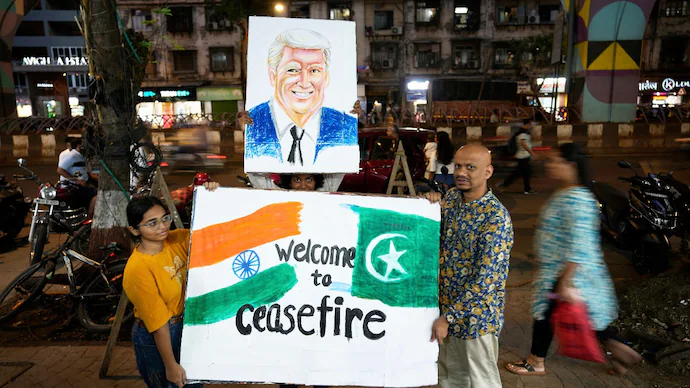Zafar Iqbal
The International Monetary Fund (IMF) is a global organization with a critical role in maintaining financial stability worldwide. Established after the Second World War, the IMF works to prevent future economic crises and promote international cooperation on monetary issues.
One of the IMF’s key functions is providing loans to member countries facing economic difficulties. These loans are not handouts, but rather act as a safety net to help countries overcome temporary financial imbalances.
The process begins when a member country facing economic challenges formally requests financial assistance from the IMF. This request typically comes from the country’s finance ministry or central bank. Following the request, the IMF sends a team of experts to the country to assess the economic situation and discuss potential solutions. This team works closely with the government to design a program outlining specific economic reforms the country needs to implement to achieve financial stability. These reforms might involve measures to reduce government spending, increase tax revenue, or liberalize trade policies. Once a program is agreed upon, the IMF’s Executive Board reviews and votes on whether to approve the loan request. The loan amount is determined based on the severity of the country’s economic problems and its capacity to repay the loan.
If the loan is approved, the IMF disburses the funds in installments, also known as tranches. The disbursement of each tranche is conditional on the country’s progress in implementing the agreed-upon reforms. This staged approach ensures that the country is adhering to the program and using the funds effectively. The IMF closely monitors the borrowing country’s progress in implementing the economic reforms throughout the loan program. Regular reviews are conducted to assess the country’s economic performance and ensure it stays on track. The borrowing country is obligated to repay the loan with interest over a set period, typically within 3 to 5 years.
It’s important to note that the IMF is not a charity. The loans come with conditions, and the borrowing country is expected to implement reforms that promote economic stability and growth. The IMF’s role is to provide temporary financial assistance and guidance to help countries get back on their feet, not to provide a permanent solution to their economic problems.
Many analysts warn that Pakistan’s latest agreement with the International Monetary Fund (IMF) could trigger a wave of inflation with severe social and political consequences. This article argues that such an outcome is avoidable, but only if the government adopts a more honest and proactive approach. The IMF programs, despite their challenges, offer significant benefits: they provide financial assistance to address balance of payment issues, signal commitment to fiscal discipline to international investors, and hold the potential for improved governance through mandated reforms. However, it’s important to acknowledge that these programs also come with a sting – austerity measures that can inflict hardship on the public.
Pakistan’s challenge lies in its historical failure to fully implement reforms while readily accepting the burdens placed on ordinary citizens. This time around, the 24th IMF program presents several critical hurdles. Increased IMF loans will further strain Pakistan’s external debt, especially considering the country’s existing struggles with repayment obligations. With a significant portion of national revenue already allocated to debt servicing, the new program adds another layer of financial pressure.
The IMF program likely entails cuts in government spending, social welfare programs, and public sector jobs. These measures, while intended to improve fiscal health, can trigger social unrest and protests.
The economic reforms may disproportionately impact lower and middle classes, exacerbating income inequality. Budget cuts could lead to decreased funding for essential services like healthcare and education, hindering access and quality for the general population. IMF-mandated policies can lead to price hikes, making basic necessities harder to afford for ordinary citizens. These potential consequences demand a more subtle approach from policymakers. The importance of proactive measures to mitigate the impact on vulnerable segments of society cannot be overstated. It is crucial for the government to step up and take responsibility for the welfare of its citizens.
The 24th program inherits a legacy of unresolved problems from past agreements. These issues, such as loss-making public enterprises, a crumbling power sector, and spiraling circular debt, remain unaddressed. The government’s lack of clarity and concrete plans for privatization or restructuring of failing entities suggests these problems may persist beyond the program’s duration. The power sector exemplifies the government’s lack of vision. Instead of addressing core issues like theft and inefficiencies, the current strategy focuses on public pronouncements against “power theft” without concrete solutions. K-Electric, a private sector entity that successfully implemented automation to curb theft, stands in stark contrast to the public sector’s inaction.
The IMF’s intervention appears limited, proposing measures like reducing tariffs and utilizing full capacity of power plants. However, these measures seem unlikely to address the deeper problems of mismanagement and lack of transparency. The burden of underutilized capacity currently falls on consumers through high capacity charges.
The issue of circular debt within the energy sector has reached crisis proportions. The government’s patchwork solutions have been rejected by the IMF. Circular debt is not just a financial issue, but a symptom of deeper governance problems riddled with incompetence and lack of transparency throughout the energy supply chain. The IMF program emphasizes increased revenue generation. However, there are limits to extracting revenue through taxes during an economic slowdown. Boosting investment and fostering a business-friendly environment are crucial for sustainable revenue growth.
The Special Investment Facilitation Council (SIFC), tasked with attracting foreign investment, seems hampered by bureaucratic red tape and outdated practices. A recent example highlights the issue: a Pakistani ambassador’s attempt to follow up on investment MoUs with the UAE yielded no response from relevant Pakistani ministries after a month. This exemplifies the need for a dramatic shift in how Pakistan approaches foreign investment, moving from a public-sector facilitation model to a more agile, business-to-business approach.
The 24th IMF program presents an opportunity for Pakistan to stabilize its economy and strengthen its position. However, success hinges on the government’s ownership of the program and its willingness to implement reforms sincerely. Transparency, proactive measures to address social concerns, and a modern approach to attracting foreign investment are all crucial for navigating the challenges ahead. Only through a comprehensive and well-executed strategy can Pakistan avoid the pitfalls of past programs and harness the potential benefits of this new agreement.
Please, subscribe to the YouTube channel of republicpolicy.com
















